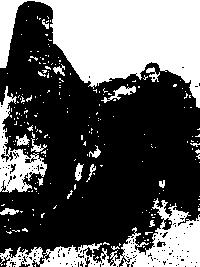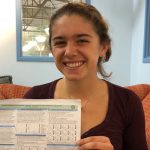
Harry Rube ’16 at the Temple of Zeus at Olympia, the site of the original Olympics. Rube studied abroad last Spring in Athens.
The United States has one of the lowest rates of voter turnout in the modern, industrialized and democratic world.
A small number of political elite involve themselves directly in decision making, while many people avoid any political action. Those that do tend to be stratified by class and income. In short, there is a dearth of democratic political participation in America.
Look back a couple thousand years to the birth of democracy in ancient Athens, and the picture is very different. According to Harry Rube ’16, “Athenians would directly vote on legislation at the assembly, as many as could fit in, and there were no representative offices. People were chosen by lot. So you could have technically, with a few caveats, anyone from any strata of society filling out a yearly office.”
Rube, a classical studies and government and legal studies double major, has dedicated this summer to researching the differences between the political scene in ancient Athens and the democratic dilemma the United States is in today. It will provide the basis for his honors project in classics next year. “That’s sort of what attracts me to this in a way…that it’s in so many ways very different from what we do,” Rube said. Part of the problem, he continued is, “we don’t make it easy for people” to vote in this country. Athens, on the other hand, “socially and institutionally promoted as much participation as possible.”
Rube’s research, which is funded by a Stahl Summer Research Fellowship through Bowdoin, consists of an “ancient-to-modern synthesis,” where he will conduct primary and secondary research on civic participation in ancient Athens. For the modern component, he plans to attend town hall meetings throughout Maine to get a sense for how participation works in this part of the country. This aspect of his work is particularly exciting, he said, because, “there haven’t been a ton of studies done on Maine town meetings.”
Although classes like Associate Professor of Classic Studies Robert Sobak’s Leisure, Class, and the Liberal Arts, and Associate Professor of Government Mike Franz’s Campaigns and Elections piqued his interest in this topic, the real driver was his semester abroad in Athens this spring. “That gave me such a great base knowledge to jump off of into thinking and talking about this stuff. I’m asking how did politics in an ancient city worked, and I know what that city looked like. I’ve walked on its streets, I’ve seen its buildings. When people say ‘could you hear people in the Athenian assembly?,’ I’ve been on the hill that they met,” Rube described.
Not only does this project give more context to his year abroad, it has also given him a different perspective on his role in democracy, and the role of the liberal arts. “Studying all these things in general gives me a better conception for what it means for me as an individual to be a citizen. I think one of the big things they try to do at Bowdoin is you get a wide variety of perspectives and knowledge — to make informed citizens to a degree,” Rube noted.
